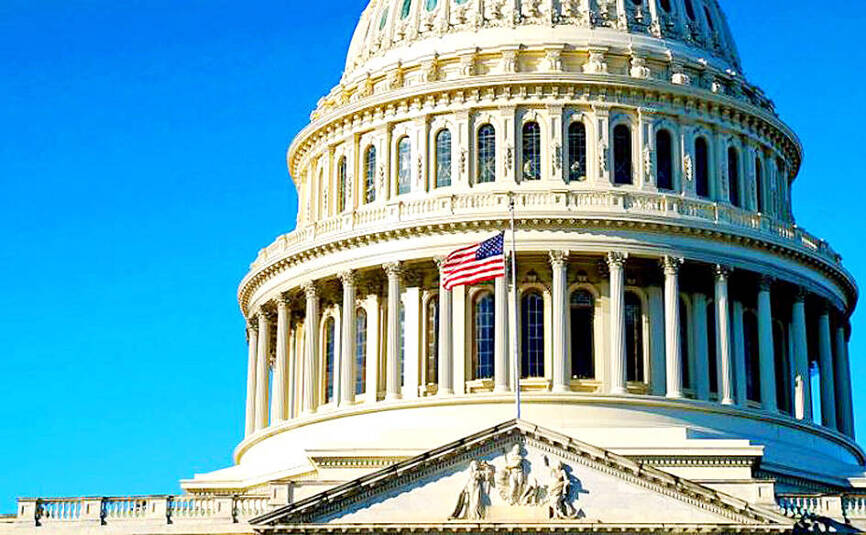Two US senators on Thursday introduced a bipartisan bill to codify the “six assurances” as a cornerstone of Washington policy toward Taiwan and prevent any unilateral changes to its longstanding position without congressional review.
The “Six Assurances to Taiwan Act,” proposed by US senators John Curtis and Jeff Merkley, would give the assurances the full force of law, ensuring the US Congress must review any attempt to alter them.
The bill, which has been submitted for review by a US Senate committee, is identical to a companion bill introduced by US Representative Raja Krishnamoorthi and several other lawmakers that was approved by the US House Committee on Foreign Affairs.

Photo: Reuters
It reaffirms that maintaining the “six assurances” is in the national, economic and security interest of the US, and contributes to peace in the Indo-Pacific region.
Under the measure, any US administration that wants to alter arms sales, revise Taiwan policies or pressure Taipei into negotiations must notify the US Congress and provide a full justification.
It also stipulates that such actions cannot proceed until the US Congress has had up to 60 days to review and potentially block it through a joint resolution of disapproval.
“Our bipartisan bill codifies a cornerstone of US policy toward Taiwan — ensuring no administration can back away from this commitment behind closed doors,” Merkley said in a statement, adding that it “sends the strong message that members of Congress from both sides of the aisle will not stand for any efforts that undermine this essential partnership.”
The “six assurances” stipulate that the US will not set a date for ending arms sales to Taiwan, consult with China on such arms sales, nor revise the Taiwan Relations Act, which underpins the US’ Taiwan policy.
Washington will not mediate between Taipei and Beijing nor change its position on Taiwan’s sovereignty, the assurances say.
“Republicans and Democrats agree that the United States must reinforce our long-standing support for Taiwan,” Merkley said.
Curtis said the “six assurances” have been a cornerstone of US-Taiwan policy since then-US president Ronald Reagan agreed to them in 1982.
“My bill simply codifies these longstanding commitments, so they carry the full weight of law,” Curtis said. “As Beijing escalates its pressure campaign, this is about clarity, deterrence, and showing Taiwan that America’s support is principled, bipartisan and enduring.”

CROSS-STRAIT COLLABORATION: The new KMT chairwoman expressed interest in meeting the Chinese president from the start, but she’ll have to pay to get in Beijing allegedly agreed to let Chinese Nationalist Party (KMT) Chairwoman Cheng Li-wun (鄭麗文) meet with Chinese President Xi Jinping (習近平) around the Lunar New Year holiday next year on three conditions, including that the KMT block Taiwan’s arms purchases, a source said yesterday. Cheng has expressed interest in meeting Xi since she won the KMT’s chairmanship election in October. A source, speaking on condition of anonymity, said a consensus on a meeting was allegedly reached after two KMT vice chairmen visited China’s Taiwan Affairs Office Director Song Tao (宋濤) in China last month. Beijing allegedly gave the KMT three conditions it had to

STAYING ALERT: China this week deployed its largest maritime show of force to date in the region, prompting concern in Taipei and Tokyo, which Beijing has brushed off Deterring conflict over Taiwan is a priority, the White House said in its National Security Strategy published yesterday, which also called on Japan and South Korea to increase their defense spending to help protect the first island chain. Taiwan is strategically positioned between Northeast and Southeast Asia, and provides direct access to the second island chain, with one-third of global shipping passing through the South China Sea, the report said. Given the implications for the US economy, along with Taiwan’s dominance in semiconductors, “deterring a conflict over Taiwan, ideally by preserving military overmatch, is a priority,” it said. However, the strategy also reiterated

‘BALANCE OF POWER’: Hegseth said that the US did not want to ‘strangle’ China, but to ensure that none of Washington’s allies would be vulnerable to military aggression Washington has no intention of changing the “status quo” in the Taiwan Strait, US Secretary of Defense Pete Hegseth said on Saturday, adding that one of the US military’s main priorities is to deter China “through strength, not through confrontation.” Speaking at the annual Reagan National Defense Forum in Simi Valley, California, Hegseth outlined the US Department of Defense’s priorities under US President Donald Trump. “First, defending the US homeland and our hemisphere. Second, deterring China through strength, not confrontation. Third, increased burden sharing for us, allies and partners. And fourth, supercharging the US defense industrial base,” he said. US-China relations under

The Chien Feng IV (勁蜂, Mighty Hornet) loitering munition is on track to enter flight tests next month in connection with potential adoption by Taiwanese and US armed forces, a government source said yesterday. The kamikaze drone, which boasts a range of 1,000km, debuted at the Taipei Aerospace and Defense Technology Exhibition in September, the official said on condition of anonymity. The Chungshan Institute of Science and Technology and US-based Kratos Defense jointly developed the platform by leveraging the engine and airframe of the latter’s MQM-178 Firejet target drone, they said. The uncrewed aerial vehicle is designed to utilize an artificial intelligence computer